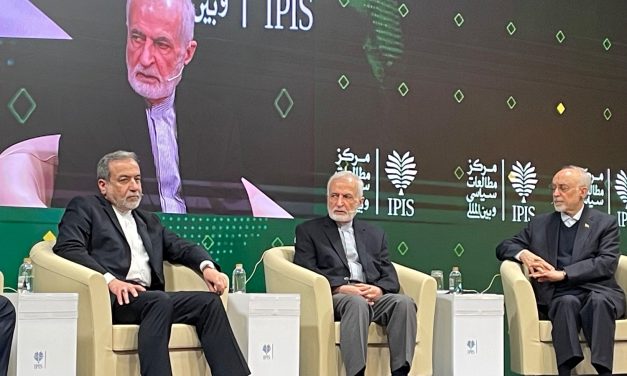Commencing on 17 June 2014, with the Supreme Leader’s emphasis on the Council’s more effective presence in foreign relations, its second term began with the appointment of new members. In His decree, “noting the necessity to complete the membership of the Strategic Council for Foreign Relations,” the following persons were appointed as the “new members” of the Council: Dr. Saeed Jalili, Dr. Ebrahim Sheibani, Hossein Taremi, Mehdi Mostafavi Ahari, and Major General Ahmad Vahidi.
On 2 January 2022, Major General Hossein Dehghan replaced Major General Ahmad Vahidi. On 27 October 2022, Dr. Sourena Sattari joined the Council and assumed responsibility for the newly established Science and Technology Commission. On 31 December 2023, Major General Seyyed Yahya Rahim Safavi replaced Major General Hossein Dehghan on the Council. Furthermore, on September 1, 2024 (10 Shahrivar 1403), Dr. Ali Bagheri Kani was appointed to the Council and served as Secretary of the Strategic Council on Foreign Relations until December 2025 (Azar 1404). On December 20, 2025 (29 Azar 1404), by decree of Dr. Kharrazi, Dr. Seyyed Jalal Dehghani Firouzabadi was appointed as Secretary of the Strategic Council on Foreign Relations.
The current members of the Council are as follows: Seyed Kamal Kharrazi, Saeed Jalili, Ebrahim Sheibani, Seyyed Yahya Rahim Safavi, Mehdi Mostafavi, Sourena Sattari, and Ali Bagheri Kani.
Objectives and Functions
- Open up new horizons, and set up long-term, midterm, and short-term strategies on foreign relations of the Islamic Republic of Iran in political, economic, defense-security, and scientific-cultural fields;
- Observe advances and barriers facing the implementation of strategies and content of the Outlook Plan;
- Outline foreign relations strategies and strategic policies through holding consultations with experts and the elite;
- Establish policy and culture, and enlighten the public’s opinion on the country’s foreign relations strategies by exploring popular capacities, media facilities, and modern means;
- Communicate with natural and legal entities, international bodies, and foreign counterparts;
- Invite incumbent officials, former foreign officials, and authorities to discuss strategic foreign relations issues.
Structure
SCFR consists of a head, 5 Commissions, and a Secretariat. Seyed Kamal Kharrazi heads the SCFR, appointed by the Supreme Leader.
Its commissions are:
- Political Commission, chaired by Saeed Jalili;
- Economic Commission, chaired by Ebrahim Sheibani;
- Defense-Security Commission, chaired by Seyyed Yahya Rahim Safavi;
- Scientific-Cultural Commission, chaired by Mahdi Mostafavi;
- Science and Technology Commission, chaired by Sorena Sattari;
SCFR commissions develop the strategies.
The Secretariat is responsible for completing the expert-related cycle of activities, drafting the SCFR enactments, and providing appropriate scientific research and services to the SCFR and its Commissions. At the same time, its domain of responsibility includes communicating with natural and legal entities, state bodies, organizations, public non-state institutes, pundits, experts, and the academic and religious school elite, while exploring expert-related products, information, and research available in Iran and other countries. The Secretariat is responsible for maintaining an effective, up-to-date treasury of information comprising significant expert-level research and reports conducted in Iran or other countries. Dr. Seyyed Jalal Dehghani Firouzabadi is heading the Secretariat.
Activities
The Council’s main and most significant activity in recent years has been drafting and submitting various foreign relations strategies in approved fields to the Leader. Other activities of the Council include organizing and hosting specialized speeches by distinguished foreign thinkers and officials, as well as holding various strategic meetings attended by senior experts from the Council’s five commissions and the Secretariat.
Specialized Library
SCFR has a specialized Library on strategic subjects for the use of elites, experts, and the country’s scientific community. It holds a significant number of resources available for all.
Website
On the website, in addition to SCFR news, you can find analyses and viewpoints from the country’s scientific community, analysts, and the elite on strategic foreign relations issues. Dissemination of these views reflects the views of respected authors or interviewees and does not constitute an official position of the Council.
Building 1 Address: No. 1, Kashani Alley, Martyr Keshvardoost St., Tehran
Telephone Number: +98-2164413131, +98-2164413176
Fax: +98-2166466270
Building 2 Address: No. 12, 1st Behestan St., Pasdaran St., Tehran
Telephone Number: +98-2122546736, +98-2122546355
Fax: +98-2122775315










0 Comments